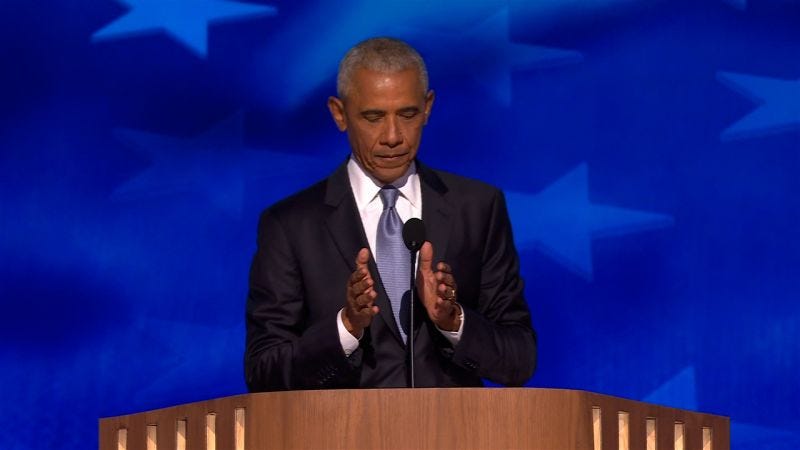EDITORIAL: They're TRIGGERING Trump, and IT'S WORKING
Why Democrats Should Go "High" and "Low"
“When they go low, we go high!”
That iconic phrase, delivered by Michelle Obama at the 2016 Democratic Convention, became a rallying cry for the Clinton campaign. It signaled a commitment to maintaining dignity and integrity in the face of Donald Trump’s provocations. For years, Democrats upheld this ethos, invoking it as a call for civility in political discourse.
Fast forward to 2024, and if you’ve been paying attention to this year’s Democratic National Convention (DNC), you might have noticed a stark change in tone. The old slogan has quietly disappeared. In its place, we’re hearing something sharper, more aggressive: "They’re just plain weird."
Democrats have finally gone on the offensive, and it’s long overdue.
Several notable moments from the convention underscore this shift. Alexandria Ocasio-Cortez referred to Trump as a “two-bit union buster.” United Auto Workers (UAW) President Shawn Fain called him a “scab.” Representative Jamie Raskin labeled Trump a “career criminal,” and President Joe Biden outright reminded everyone that Trump is now a convicted felon. Even Jasmine Crockett took a jab, calling him out as a “nepo baby,” while Michelle Obama spoke of the “affirmative action of generational wealth.”
This is a refreshing change in strategy. The Trump presidency and the MAGA movement represent significant threats to democracy, and it’s time Democrats start treating them that way.
But there’s an important distinction: while it’s crucial to critique Trump seriously, there’s a risk in framing him as some all-powerful villain. That can feed into his image as a “strongman.” Instead, what we saw at the DNC was a brilliant strategy to portray Trump as small, whiny, and petty—undermining the strongman image he has carefully cultivated.
One of the most talked-about moments was Barack Obama’s swipe at Trump’s vanity, subtly mocking him for having a small penis. While crude, it struck a chord. This jab wasn’t about Trump’s body but rather his obsession with it. For years, Trump has fixated on crowd sizes, physical appearances, and personal accolades—an obsession that reveals deep insecurities.
Trump’s need for constant validation—whether it’s inflating his business success or exaggerating his physical attributes—points to a fragility that makes him ripe for mockery. This kind of humor highlights Trump’s childishness and desperate need for attention. It’s long overdue for Democrats to use Trump’s insecurities against him.
Of course, mocking Trump’s appearance is not enough on its own. While going low can be effective, it must be paired with substantive criticism of his policies and character.
This is where Minnesota Governor Tim Walz comes in. His line—“they’re just plain weird”—captures what many Americans feel about the Republican fixation on culture wars. In his DNC speech, Walz didn’t just throw a playground insult; he backed it up with policy critique.
“When they talk about freedom—freedom to be in your bedroom, freedom to be in your exam room, freedom to tell your kids what they can read—that stuff is weird.”
Walz succinctly articulated what so many feel: it’s bizarre that Republicans are so obsessed with LGBT rights, reproductive health, and banning books. These aren’t policies that solve real problems; they’re distractions aimed at inflaming cultural divisions. Walz drives home the point that the GOP’s priorities are not just wrong—they’re out of touch with what most Americans care about.
Walz didn’t stop at cultural critiques. He pointed to Project 2025, a sweeping right-wing agenda being pushed by Trump and his allies, as another example of how extreme the GOP has become. This plan serves only the wealthiest and most radical conservatives. In Walz’s words, “It’s an agenda that does nothing for our neighbors in need. Is it weird? Absolutely.”
This has clearly struck a nerve. Republicans have fired back at Walz, dubbing him “Tampon Tim” after he signed a law requiring schools to provide menstrual products in bathrooms for students who need them. Of course, the GOP twisted the facts, falsely claiming that tampons are required in boys' bathrooms. And Trump? He responded by saying that Walz is “heavy into transgender” issues.
This whole back-and-forth over “weirdness” has turned into a proxy war over social issues, where Republicans are most vulnerable. As public support for LGBT rights and reproductive freedoms continues to grow, the GOP’s extreme positions on these matters appear increasingly out of step with mainstream America.
Kamala Harris has also adopted this more pointed rhetoric. In her stump speeches, she calls Trump a “predator,” a “fraudster,” and a “cheater.” These may seem like personal attacks, but they’re grounded in truth—and they target aspects of Trump’s character that actually resonate with voters.
Trump is a predator, and his history of sexual assaults matters. He is a fraudster, and his record of not paying workers, from hotel dishwashers to his own lawyers, matters. He is a cheater, and his attempt to overturn the 2020 election matters.
By focusing on these substantive critiques, Harris and Walz show how Democrats can go both high and low. Yes, mock Trump’s weirdness, his narcissism, and his insecurities. But always tie it back to real issues—his unfitness for office, his policies that hurt working people, and his obsession with controlling the personal lives of Americans.
Because in the end, Trump isn’t just a danger. He’s weird. And it’s time more people start calling him out for it.




Excellent critique. You go a long way toward linking issues trump madly attempts to divide. The focus is becoming clearer. TY
Well said David. I am over 70 yrs but appreciate how you patiently explain the facts to generations that come after mine.